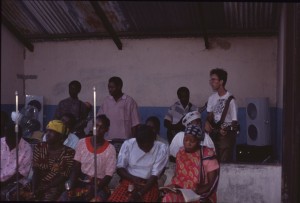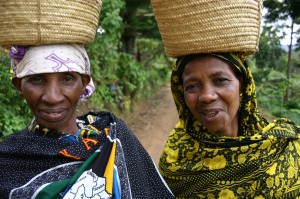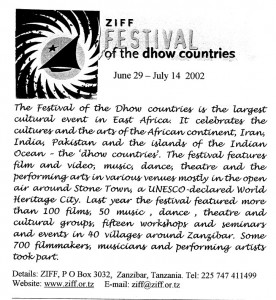A comprehensive 52-page agreement (Muafaka) was signed on October 10, after eight months of negotiations, between the respective Secretaries General of the ruling Chama cha Mapinduzi (CCM) party, Philip Mang’ula and of the opposition Civic United Front (CUF) Seif Sharrif Hamad. The long standing political crisis in the isles has been explained in many issues of ‘Tanzanian Affairs’ since 1995 when the results of the elections in the Isles in that year were questioned by some observers. The situation was exacerbated when the 2000 elections were widely considered as having been rigged. Opposition dissatisfaction culminated in over 20 deaths during rioting on 26 and 27 January 2001 and the flight to Kenya of more than 2000 refugees. President Mkapa admitted that these events had been ‘a stain on the history of the nation’. After the signing, which was a happy and emotional event, donor agencies indicated that aid to Zanzibar would be resumed once the agreement was implemented.
THE AGREEMENT IN DETAIL
The agreement is comprehensive and responds to many but not all of CUF’s demands, including reform of the much criticised Zanzibar Electoral Commission, the introduction of a permanent register of eligible voters, a review of the existing constitution and electoral laws (by February 2002) to make them conform to a multi-party political system, fair coverage of both parties in publicly-owned media, and payment of compensation to those affected by earlier disturbances. CCM refused to accept CUF’s demand for a re-run of the 2000 elections but accepted that CUF would be involved in government affairs through the offer of ambassadorial posts and membership in various institutions. There would be by-elections in the 16 CUF constituencies which were declared vacant when CUF MP’s had been expelled following their boycott of proceedings in the House of Representatives. There would be an independent enquiry (to be concluded by April 2002) on the rioting. Talks regarding a possible coalition government were to start not later than June 2003 and would be held under a 10-person joint ‘Presidential Commission on Implementation and Monitoring’ to monitor implementation of the agreement. The precise powers of this commission are not clear but it does indicate a move towards sharing of power. After the signing of the agreement, 109 criminal cases related to January’s unrest including a murder charge against CUF Assistant Secretary General Juma Duni Haji, were dropped.
“FROM NOW ON I WILL SLEEP MORE SOUNDLY” – MKAPA
At the ceremony marking the occasion President Mkapa said: “This is a day of great pleasure and satisfaction to me personally. From now on I think I will sleep more soundly. For, it is true that the political crisis in Zanzibar has weighed heavily on my shoulders. The deaths that occurred in January 2001 in Unguja and Pemba (Tanzanian Affairs No 69) disturbed and saddened me greatly…. We were used to hearing of such deaths in other countries, not in ours. The decision of our fellow citizens to seek refuge outside the country also made me sad, and shamed our nation. We are used to receiving refugees, not creating refugees…. Our people expected too much from me in bringing this crisis to an end. Political parties, likewise, expected too much from me. High Commissioners and Ambassadors, and their Governments, all the time wanted me to do much more; sometimes without regard to constitutional requirements and the limits of my powers. But, more importantly, they forgot that one person couldn’t solve a crisis like this, unless he can make miracles, and I could not make miracles. The only miracle option I had was to revert to African traditions and ways of resolving conflicts, under which even before colonialism, our elders, when confronted by a major crisis, used ‘to sit under a tree’ discuss, listen to each side, weigh each argument, without regard to how long it took to reach an agreement. The overriding objective always was to reach consensus -a consensus that takes into account the concerns and interests of each side, a consensus in which there are no winners and no losers, a consensus that will be respected by each side, because each side considers itself part of the process and of the agreement reached; all sides professing equal rights and equal responsibilities. And this is what we did this time…. There were those who said the drawn out negotiations were only a CCM tactic to buy time. There were those who wanted to resort to violent shortcuts. But the top leadership of both CCM and CUF stood firm, guided by the African way of doing things, and continued to ‘sit under a tree,’ day after day, week after week, month after month, and today as the Kiswahili saying puts it: ‘They said it can’t happen; it has happened!’ I should like on this occasion to thank most heartedly the Secretaries General of CCM and CUF, Honourable Philip Mangula and Honourable Seif Shariff Hamad, together with their negotiating teams. They all did an excellent job; with great wisdom; guided by a sense of nationalism; and when they were ridiculed they did not pay attention, focussing instead on the ultimate goal, the goal that puts national interests first, and the goal of the restoration of peace, stability, dignity and integrity in national politics. I am deeply grateful to my fellow Tanzanians for their patience. As the Swahili proverb says: ‘It is he who is patient that eats the ripe fruit’….. Tanzania is a country for all Tanzanians and not for a group of people. CCM is part of today’s signed agreement and I myself as the president of the Union and CCM National Chairman, I promise to implement fully the agreement. … ”
Zanzibar President Amani Karume added that the signing of the agreement would be meaningless, if it were not fully implemented.” CUF National Chairman, Prof. Ibrahim Lipumba, said that both CCM and his party should forgive each other, but not forget the past. “Forgetting what happened in the past six years may lead us to repeat similar mistakes in the future” he said.
BRITAIN AND THE EU WELCOME THE PACT
The EU congratulated the leaders of the two parties in particular and Tanzania in general for showing determination to resolve their longstanding conflicts peacefully and said that it would increase its assistance to NGO’s on the isles. The British government also sent congratulations “This is wonderful news for all good friends of Tanzania. I pay tribute to the leadership of both CCM and CUF for their vision and courage” British Foreign Secretary Jack Straw said in a statement issued by the British High Commission in Dar es Salaam. Most of the 2,000 refugees who had fled Zanzibar after the January clashes have returned to Zanzibar although a group of 103 reportedly arrived in the Somali capital, Mogadishu, from Kenya on October 6.
THEN A SETBACK
Amidst all the euphoria however, when it came to enactment of legislation to implement the agreement, problems arose. The East African reported that three clauses in the Agreement had been changed and others dropped. Zanzibar Attorney General Iddi Pandu Hassan said that the agreement had been signed between the political parties and that the Zanzibar Revolutionary Government had the right to examine the agreement if it felt that the security of the state was at stake.
The Guardian reported that he had deleted provisions allowing for discussions on the possible formation of a coalition government, and for regular monthly discussions with Zanzibar President Karume. Punishment for those who ‘distorted’ the agreement were apparently excluded from the Bill.
CUF’s reaction was swift. On November, 14 at its National Conference in Zanzibar attended by over 1,000 delegates (said to have been paid for, in the new spirit of amity, by the Government) Secretary General Seif Hamad indicated that CUF would withdraw from the agreement if these changes were made.
The Government then presented the Bill to the Zanzibar House of Assembly (which has only CCM members as the CUF MP’s had been expelled earlier for boycotting the proceedings) and it was passed. Minister of State in the Chief Minister’s Office, Salim Juma Othman said that the amendments made were very minor and were designed to facilitate successful implementation of the agreement and would not affect its substance. Earlier, the Chairman of the Judiciary, Constitution and Good Governance Committee of the House, Ali Juma Shamuhuna, said that the Revolutionary Council did not err in amending the accord because the amended sections interfered with the powers of the President of Zanzibar and were against the Zanzibar constitution. Empowering the CCM-CUF monitoring committee to imprison a person for one year or impose a fine of up to Shs 500,000 for blocking the accord interfered with the powers of the judiciary. The House of Representatives also did not have powers to pass laws concerning the Union. During the session many CCM MP’s called on the political parties to respect the amendments put forward by the Revolutionary Government because the accord had not been a legal document but a draft of suggestions by the two political parties.
As this issue of ‘Tanzanian Affairs’ went to press CUF Chairman Lipumba was reported to have threatened to call for a nationwide demonstration on January 27, 2002, the first anniversary of the riots in Zanzibar, and said that CUF would not recognise the Bill passed by the House. However, discussions between the parties were said to be continuing
ZANZIBAR NOW OFFERS 100% FOREIGN OWNERSHIP
Zanzibar President Amani Karume has announced lucrative packages for potential investors in the isles. He told senior executives and potential investors at a Commonwealth-Tanzania Investment Conference in Dar es Salaam that foreign investors would be allowed to establish business ventures with 100% ownership, “We shall continue to remove administrative and legislative barriers to foreign direct investment,” he said. He added however, that the Isles Government would like foreign investors to consider entering into partnership with domestic investors and mentioned hotels, transport, agriculture, fishing and communication as viable sectors. There would be exemptions of export duty for all goods, exemption of import duties or sales tax charged on machinery, equipment, spare parts, raw materials, and supplies necessary for investments. There would also be a 10 year tax holiday on dividends and exemption of income tax for an initial period of 10 years.



